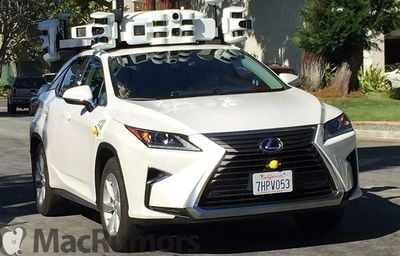New regulations that allow driverless autonomous cars to be tested on California roads were officially approved by the California Office of Administrative Law on Monday, reports the San Francisco Examiner.
Starting on April 2, companies in the Bay Area that are working on self-driving vehicle technology will be able to deploy cars that do not have a driver behind the wheel. The new autonomous vehicle regulations have been under review since January 11, but were green lit this morning.

The news is of interest as Apple is one of more than 50 companies testing self-driving vehicle technology in the Bay Area. For almost a year now, Apple has been testing autonomous driving software in a series of 2015 Lexus RX450h SUVs, which can often be seen on the streets surrounding its Cupertino headquarters.
While little has been said about Apple's testing efforts in recent months, the company was spotted using new LIDAR equipment in August of 2017, and as of January 2018, Apple has 27 vehicles running autonomous driving software, up from the three it started with last year.
With the new regulations in place, Apple can potentially apply for a new deployment permit with the California DMV that would allow it to test its software sans drivers. It's not known, however, if Apple is ready for that kind of advanced testing.
While California is allowing companies to deploy and test fully autonomous driverless cars, a "communication link" must be maintained between the testing vehicle and remote operators. All remote vehicle operators must monitor the status of driverless vehicles at all times and be ready to step in should the vehicle experience "failures that would endanger the safety of the vehicle's passengers or other road users." Cars must be protected from cyberattacks and must also be able to transmit information in the event of a crash.
Companies must also certify that a vehicle is capable of operating without the presence of a driver and develop a "law enforcement interaction plan" to be provided to the California Highway Patrol.
Should Apple choose to take advantage of the new policies, the company will need to obtain a permit from the California DMV, and granted permits are made available to the public. So should Apple opt for this route, it won't be able to keep its work secret. These kinds of regulations have already spurred Apple CEO Tim Cook to confirm the company's work on autonomous systems.
"We're focusing on autonomous systems. It's a core technology that we view as very important. We sort of see it as the mother of all AI projects. It's probably one of the most difficult AI projects actually to work on," Cook said back in June of 2017.
Some other states have already adopted more relaxed rules that allow companies to deploy autonomous vehicles without drivers. In Arizona, for example, Google-owned company Waymo is already operating autonomous minivans sans safety driver.























